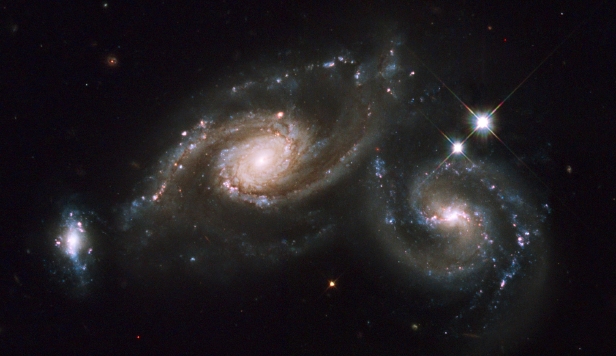Velvet Oblivion
Part 3
For my next research question instead of an article, I explored a discussion forum where anyone can submit questions or open a dialogue with an astronomer. The one I read addressing the death of our galaxy was written by Karen Masters who received her PhD from Cornell University and went on to Harvard Smithsonian Center for Astrophysics to complete a post-doctrine.
 |
| Galaxies Merging |
Her response to the question "will the Milky Way Galaxy die?" started with how we can tell the age of the galaxy which is by calculating the age of the oldest known Globular Clusters in the milky way which happens to be around 15 billion years old. She then concludes by addressing the fate of the Milky Way "is not to be swallowed up by the central Black Hole, but to merge with Andromeda (which is moving towards us) to form a much larger elliptical galaxy."
It's typical for galaxies to interact and to merge together once and awhile. Astronomers have actually photographed the process of two galaxies colliding, but since it takes millions of years for them to actually collide usually only one photograph is taken from one of the many stages during its collision. I also explored another answer to the question "what happens when galaxies collide?" since it seemed to be closely related to Karen Master's discussion. In this forum, on the same site, astronomer Amelie Saintonge stated that "if galaxies were made only of stars, and that two of them would go on a head on collision, they would pass one through another without being much affected."
 From these two discussion forums I concluded the answer to if our galaxy would have a time of death, which I was happy to hear that we would simply collide with Andromeda before Sagittarius A-star swallows us. Of course this wouldn't happen in the life time of the human race, we'll all be long gone by then before the fate of our galaxy is decided. That is, if we aren't inhabiting another part of space. It was also amazing to me that if two galaxies merge then not one single star will collide! Now that I explored the death of our galaxy, would the death of our universe be possible? Does our universe have a beginning reaching to the start of time, will it have an end? My path of research was narrowing down to my final question of is the universe expanding. But first, I had to find out if the death of our universe is possible because that would relate to the three theories I know of that begin with the big bang and what the after effects are. The search to find the possibilities of the universe dying, or "contracting" lead me to my next research topic.
From these two discussion forums I concluded the answer to if our galaxy would have a time of death, which I was happy to hear that we would simply collide with Andromeda before Sagittarius A-star swallows us. Of course this wouldn't happen in the life time of the human race, we'll all be long gone by then before the fate of our galaxy is decided. That is, if we aren't inhabiting another part of space. It was also amazing to me that if two galaxies merge then not one single star will collide! Now that I explored the death of our galaxy, would the death of our universe be possible? Does our universe have a beginning reaching to the start of time, will it have an end? My path of research was narrowing down to my final question of is the universe expanding. But first, I had to find out if the death of our universe is possible because that would relate to the three theories I know of that begin with the big bang and what the after effects are. The search to find the possibilities of the universe dying, or "contracting" lead me to my next research topic.
Just for fun here's a picture of the Orion Nebula, one of the most beautiful out there.

What I find most fascinating about the upcoming galactic collision is that it will start before our own sun has died... although Sol won't outlive the merger, it'll be here for its start. WOW!
ReplyDeleteCR99nut